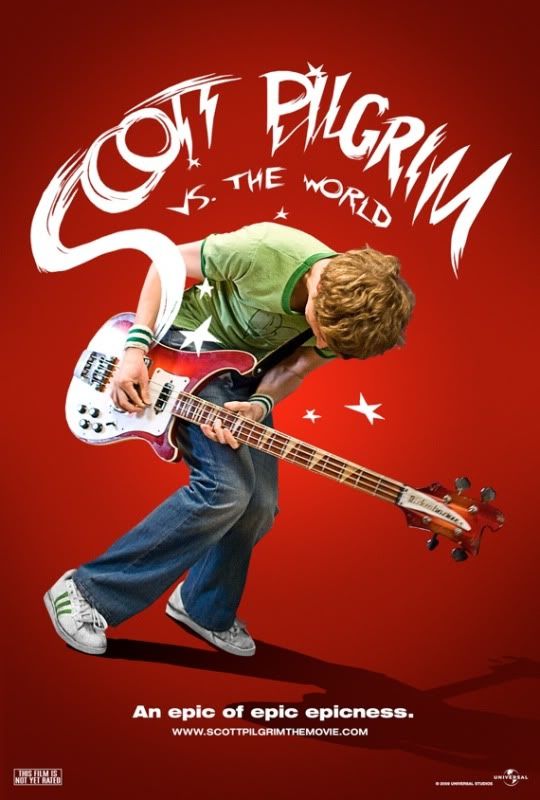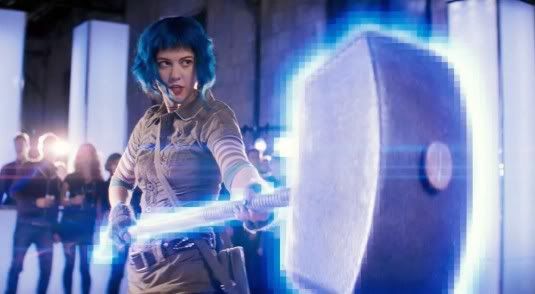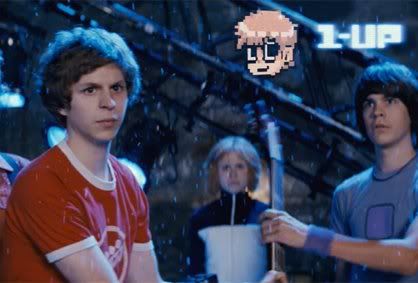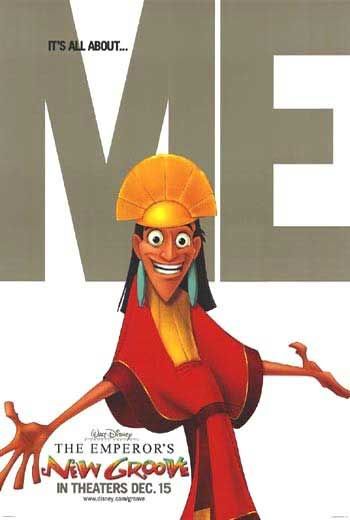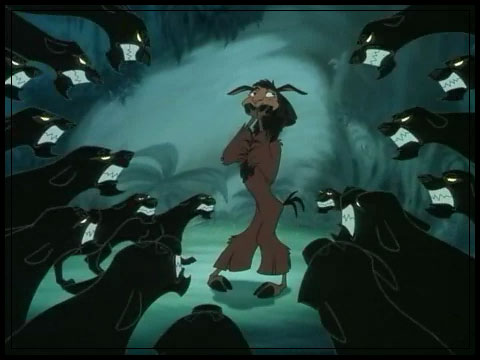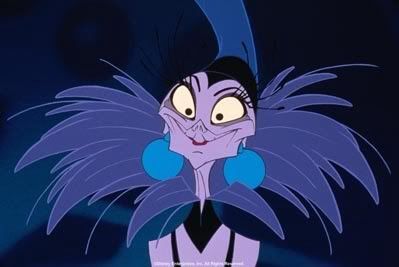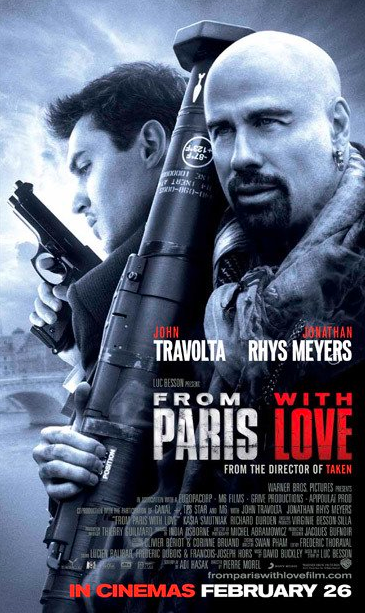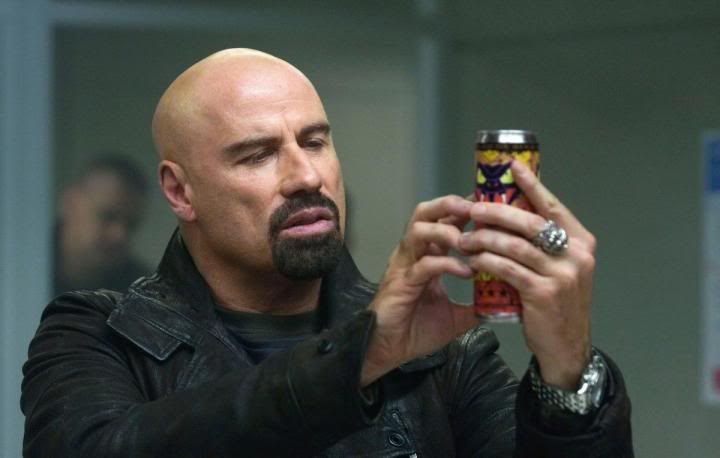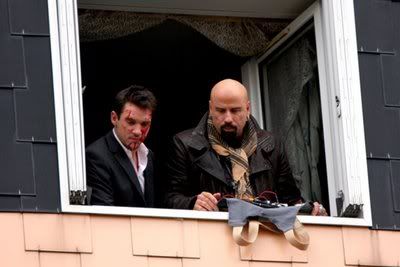
[audio:http://www.blueinkalchemy.com/uploads/daredevil.mp3]
There was a time when it seemed implausible that superheroes that didn’t already exist in the general public’s somewhat limited imagination could succeed as motion pictures. People remembered Christopher Reeve as Superman and Batman had a TV show in the 60s that Tim Burton and Michael Keaton could use as a springboard for their darker, edgier take. But Iron Man? Thor? Captain America? A decade ago these costumed crusaders wouldn’t have had much of a chance. A lot of people at the time would have pointed to 2003’s Daredevil as an example of why the lesser-known names can’t make it at the box office. This is perplexing to me, because despite some of its shortcomings, Daredevil most decidedly does not suck.
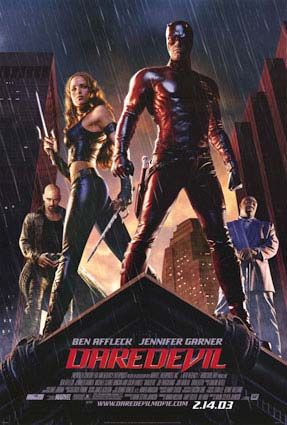
By day, Matthew Murdock is an attorney working a variety of pro-bono and low-rate cases in Hell’s Kitchen. He and his partner Foggy Nelson fight for the underdogs who wouldn’t have a chance otherwise. By night, Murdock prowls the streets as Daredevil, an acrobatic vigilante who is said to be absolutely fearless. The catch is, Murdock is blind. The accident that robbed him of his sight as a child hyper-sensitized his other senses, giving him a type of echolocation and the sort of reflexes that lead him to train as a martial artist. His goal is to topple the enigmatic Kingpin slowly consuming the criminal underworld in New York, but his encounter with a young woman named Elektra who matches his martial skills changes his life and may cause him to hang up his cowl forever.
Daredevil features characterization as its most prominent success. There is some definite chemistry between Matt & Elektra. Winston Fisk, the aforementioned Kingpin, has the sort of intimidating physical presence that, to quote Roger Ebert, “makes the camera want to take a step back and protect its groin.” I’m a fan of Michael Clarke Duncan and this is very good work on his part. Kingpin’s specialized hitman, Bullseye, seems possessed with a manic magnetism that has the audience watching his every move just to see what crazy thing he does next. Even minor characters’ little nuances come through in the writing and acting, from Foggy’s quirky sense of humor to reporter Ben Urich’s dedication to unmasking Daredevil.
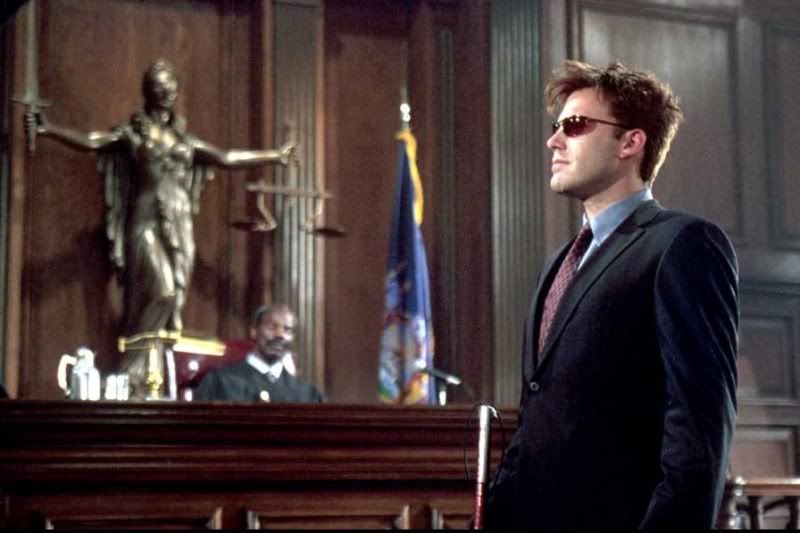
“Your Honor, I submit this work for the pleasure of the court and ask that Armageddon be stricken from the record. And my memory.”
The biggest question hanging over this production is if Ben Affleck was right in the leading role. The best answer I can offer is Marvel could have done much, much worse. Despite criticism that’s been leveled at Affleck in the past, he portrays Murdock with honest charm, real humanity, and a haunted vulnerability. One of the best ways to show your audience that your hero is not invincible and a relatable character is to hurt him, and Ben’s pretty good at conveying pain. It’d be nice if he didn’t narrate so much in the beginning, though. He’s not terribly good at delivering one-liners, either.
Daredevil does suffer from its share of flaws. The pace of the movie is somewhat schizophrenic, never seeming to strike just the right balance between having fun and being dramatic. Superhero stories do tend to be melodramatic, what with their hyper-realized heroes going through emotional changes before our eyes on big screens with bombastic surround sound, but this one goes a bit too far in places. Finally the action is undercut rather than underscored by the hit-and-miss soundtrack, which includes that one song Nickelback does.
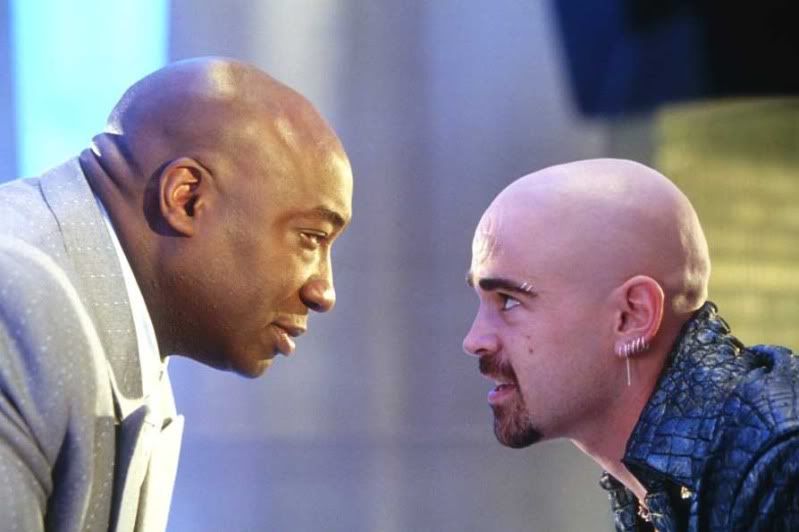
“Bullseye. Are you thinking what I’m thinking?”
“I dunno, boss… Guinness, football and hookers?”
Still, director and co-writer Mark Steven Johnson shoots clean, crisp scenes and makes the most of the characters he introduces. This is especially true in the Director’s Cut. A lot of the problems of pace I mentioned are solved when the romance is cut back, the duality of Matt’s life is increased and the reality of the situation is driven home in the expansion of the fights. This version of the film is rated R, while the theatrical release skated by with a PG-13 rating. I suspect that in order to appeal to kids, especially everybody who was really into Evanescence at the time, the romance was amped up and the “boring” courtroom stuff cut back. Which is a shame, because seeing the way Matt and Foggy work a courtroom and the things their client says on the stand are a real joy.
This movie, like its namesake, dwells in darkness. It’s a brooding, driven piece of work. Even in its’ director’s incarnation, it’s flawed. However, the shortcomings I’ve mentioned never quite overshadow the good things in it, the hallmarks of a genre shaking off the dark and gritty late 90s that gave us hard-edged anti-heroes like Spawn. Daredevil is edgy, but that edge is tempered with bits of humor and humanity that elevate it just above the surface of the dark and swampy waters of your typical Hollywood fare. I’d recommend it.
One thing of note to conclude: the superior Director’s Cut is not available on Netflix. I watched it through Amazon’s On Demand service. But the standard edition isn’t bad, and you can add that to your Netflix queue if you’re it sounds like this is the sort of superhero movie you’re looking for. I do try to be honest in what I do, but I established the title of this series quite some time ago. I can’t exactly change it every week to say “It came from Amazon”, or “It came from my basement”, or “It came from the side of the road”, or “It came from my friend Ben’s house.”
Josh Loomis can’t always make it to the local megaplex, and thus must turn to alternative forms of cinematic entertainment. There might not be overpriced soda pop & over-buttered popcorn, and it’s unclear if this week’s film came in the mail or was delivered via the dark & mysterious tubes of the Internet. Only one thing is certain… IT CAME FROM NETFLIX.

